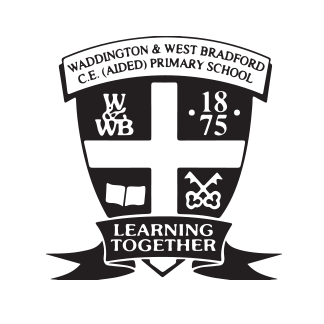English - Reading
Intent
At Waddington and West Bradford CE Primary School, we believe that all pupils should have the opportunity to be fluent, confident readers who are able to successfully comprehend and understand a wide range of texts. We want pupils to develop a love of reading, a good knowledge of a range of authors, and be able to understand more about the world in which they live through the knowledge they gain from texts. By the end of their time at primary school, all children should be able to read fluently, and with confidence, in any subject in their forthcoming secondary education. We do not put ceilings on what pupils can achieve in reading, and we do not hold pre-conceptions about any pupils’ ability to make progress. We understand the importance of parents and carers in supporting their children to develop both word reading and comprehension skills, and so we want to encourage a home-school partnership which enables parents and carers to understand how to enhance the skills being taught in school through good quality texts.
Implementation
Classroom organisation: We teach phonics and reading skills as whole class lessons, so that all children have access to the age-related skills and knowledge contained in the National Curriculum. Within lessons, teachers and teaching assistants target support for those children working below age related expectations to enable them to achieve at an age-related level wherever possible. Children working above age related expectations are also given opportunities to demonstrate a greater depth of understanding through extended answers, targeted questioning requiring more reasoned answers and making greater links across and between texts. Phonics: Early Years and Key Stage 1: Pupils are taught as a whole year group, focussing on individual sounds, groups of sounds and common exception words within different ‘phases’. We have an agreed progression for the teaching of new sounds and use Red Rose Phonics to support this. Children working below age related expectations are given additional support from teachers and teaching assistants, either within the whole class lesson or as part of planned interventions that take place in addition to the lesson. During the Summer Term in Year 1, pupils undertake a Phonics Screening Test which assesses their ability to apply what they have learnt. After this, all children move towards whole class reading lessons that take the same model as Years 2 to 6. Pupils who do not pass their Phonics Screening Test continue to have intervention to support the acquisition of these key skills.
Whole school Reading Scheme: Children following the phonics programme take home phonetically-decodable reading books in line with what they have learnt at school. At the end of the phonics teaching phases, children progress onto using Accelerated Reader. This ensures progression in both word reading skills and comprehension. Children have access to a wide range of texts and are encouraged to embed their reading skills within each stage. All pupils have a home-reading record which they are encouraged to take home daily. Parents and carers are asked to add comments to the home-reading records to indicate how much pupils have read.
Feedback: Feedback should be completed, where possible, within the lesson. All feedback is given in line with our marking and feedback policy.
Summative Assessment: Summative assessments will be recorded each half term and reported termly. Teachers will use their professional judgement to determine whether a child is working within age-related expectations, above or below. They will base their judgements for the most part on the quality of the written outcomes pupils given after structured teaching within the agreed reading skills. Teachers also complete reading assessments (e.g. past SATS papers, testbase) to provide another piece of evidence to support their assessment judgement. If tests are used, care is taken to ensure that pupils are prepared appropriately for the test, and any barriers to accessing these are removed.
INTENDED IMPACT
• Pupils will enjoy reading across a range of genres
• Pupils of all abilities will be able to succeed in all reading lessons.
• Pupils will use a range of strategies for decoding words, not solely relying on phonics.
• Pupils will have a good knowledge of a range of authors.
• Pupils will be ready to read in any subject in their forthcoming secondary education.
• Parents and carers will have a good understanding of how they can support reading and home, and contribute regularly to home-school records.
• The % of pupils working at ARE within each year group will be in line or above with national averages.
• The % of pupils working at Greater Depth within each year group will be in line or above with national averages.
• There will be no significant gaps in the progress of different groups of pupils (e.g. disadvantaged vs non-disadvantaged)




